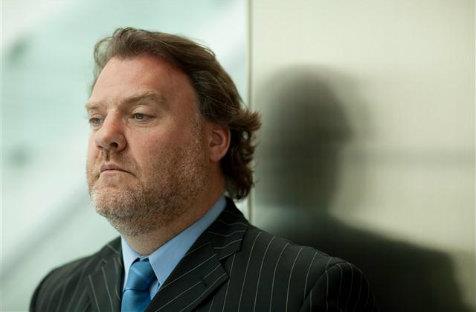It was an evening with Bryn Terfel. Not a morning wake-up call, not a pleasant afternoon tea, not a midnight stroll, not a week long trek through the Himalayas, but an evening with Bryn Terfel. (I try to remember if I’ve ever seen something prefixed with ‘an afternoon with’, but nothing comes to mind. There’s something more final about an evening, I think, something that suggests an end to things and an in-built maturity, whereas an afternoon seems frivolous by comparison. Live music is best taken nocturnally, I think, for there’s something primitive and safety-of-the-campfire about it, as if you’re beating back the dark.)
Usually one tries to go into a concert with a bit of foreknowledge, though not too much, however, for one doesn’t want to let preconceptions taint the experience. Last year, there was a rather lovely concert given by the Melbourne Symphony Orchestra in the Concert Hall of the Sydney Opera House, entitled Deborah Voigt in Concert. (Deborah Voigt, a world renowned soprano, sang Brunnhilde in the Met’s latest production of the Ring Cycle.) Except Voigt had to undergo extensive surgery, and so the event was renamed Angela Denoke in Concert, with the German soprano taking over the vocal duties. The Melbourne Symphony Orchestra was in fine form that night, and the repertoire was quite Wagner-heavy. Very big, very dramatic, very spectacular. And so, with this evening of Bryn Terfel’s (who sang Wotan in the same Ring Cycle as Voigt), I, for some reason known only to my fickle subconscious, was expecting a full symphony, and a sizable chunk of Wagner to go with it. I got a piano instead.
I’m not sure which of them was expensive – the piano or the bass-baritone – but the tickets being $169 for the premium seats (more costly than virtually all Sydney Symphony tickets) certainly suggested a great quality (one of the best voices in the world), a great popularity (a fan favourite), or a great undertaking (a full orchestra). The latter wasn’t the case; the first two were no doubt the reason. One tries not to have preconceptions, but having a full orchestra in your mind reduced to a lone piano has an effect, and it is testament to Terfel’s abilities that this still managed to be an absolutely fabulous concert.
That Terfel is a witty host certainly helped proceedings. The evening was interspersed with four or five sections of anecdotes that told of why he had chosen his selections. He talked of his love of his teachers, including those that were cruel-to-be-kind, that domineered and sent him crying from the room on occasions. He talked of meeting with Geoffrey Rush and turning down (stupidly) the role of Harry Secombe in a television series he wanted to make. (‘I can’t play Harry Secombe: I’m too tall!’) And he talked of all of this without a microphone, his speaking voice booming out across the Hall loud and clear. (One can’t speak to those at the very back of the circle, however, but if they couldn’t hear his anecdotes, they certainly would have heard his singing.)
The first half of the program was all about songs in English. It began with a trio of songs set to music by John Ireland, with Sharolyn Kimmorley accompanying on the piano (as she did for the entire night). They were ‘Sea-Fever’, ‘Vagabond’, and ‘The Bells of San-Marie’. And with these it was already clear that the audience was in for a special treat.
Terfel’s voice is so full and without strain, and his diction is so palpable (how often did one hear the extra ‘st’ sound at the end of drawn out word such as ‘last’, that extra flick of the tongue in the mouth that closes off the pronunciation which in other singers might be dropped?). One had a sense throughout that Terfel nourished each and every syllable, polishing them all until there was no need for any in the audience to read the texts in their program. (A rather expensive program at $15, too, for what one got in it, but this was alleviated somewhat by a free double CD of Terfel recordings (Bryn Terfel: A Song in My Heart) that came with the purchase while stocks lasted, which thankfully they did.)
Peter Warlock’s music to ’Captain Stratton’s Fancy’ came next, followed by three pieces of Federick Keel’s (‘Port of many ships’, ‘Trade Winds’, and ‘Mother Carey’). All the text of the above pieces were poems of John Masefield, a favourite of Terfel’s. Roger Quilter’s music followed, with ‘Now sleeps the crimson petal’, ‘Weep you no more, sad fountains’, ‘Go, lovely rose’, and ‘Fair hose of joy’, before the interval, at an usher-surprising 35 minutes into the show, began.
Afterwards we were treated to some German lieder, with Schumann’s ‘Die beiden grenadiere’ bringing a rousing power from the bass-baritone. ’Widmung’ followed, then ‘Du bist wie eine blume’ and ‘Mein wagen rollet langsam’. Schubert entered the fray with ‘Auf dem wasser zu singen’ ‘Litanei’ (Terfel’s favourite), and ‘Die Forelle’, before we were back in Britain with ‘Passing By’, ‘Danny Boy’, ‘All Through the Night’ (in Welsh, and hummed along to by the audience), and ‘Loch Lomond’, with the full Concert Hall in accompaniment.
The first encore was a whimsical piece about a scary and big brown bear, while the second was (finally) a bit of Wotan from Wagner’s Das Rheingold, where Wotan leads across the bridge to Valhalla. And so ended a fantastic concert. Terfel has a superb sense of the drama in the songs he is singing, and with his meticulous attention to diction and full tones, one can only hope he makes his way back to Australia soon.
Rating: 5 stars out of 5
An Evening with Bryn Terfel
Bryn Terfel – bass-baritone
Sharolyn Kimmorley – piano
Concert Hall, Sydney Opera House
30 April





